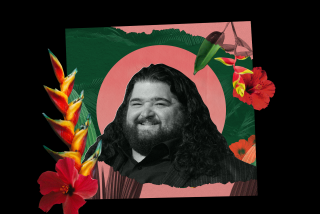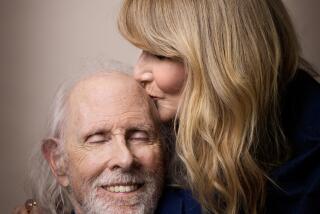‘Huxley on Huxley’s vibrant spirit
- Share via
In the pantheon of Hollywood power couples, Laura and Aldous don’t spring to mind as readily as Liz and Dick, F. Scott and Zelda or Angelina and Brad.
But although their seven-year union was brief, it’s tough to imagine a more profound marital connection than the one between Aldous Huxley, the urbane British author of the dystopian novel “Brave New World,” and his second wife, Laura Archera, a classically trained musician, lay analyst, bestselling author, avowed humanist, irrepressible eccentric and certifiable life force.
Such, at any rate, is the impression left by “Huxley on Huxley,”
“There were so many stories that I couldn’t put into the film, because it would’ve gone off on so many tangents,” says Braubach, 53, a veteran Hollywood documentary maker and film and TV executive who formerly served as George Lucas’ development director.
The 58-minute story that Braubach eventually decided to tell in “Huxley on Huxley” has enough facets to potentially hook several different viewing constituencies, including world peace activists (Aldous was a prominent pacifist) and proponents of the consciousness-raising properties of hallucinogens.
Narrated by Peter Coyote, it includes interviews with an assortment of colorful characters drawn into the Huxleys’ intellectual and creative orbit. Among them are Nick Nolte, John Densmore, drummer for the rock band the Doors (the group’s name was famously inspired by Aldous Huxley’s book “The Doors of Perception”) and Don Bachardy, the portrait artist and surviving longtime partner of Isherwood (another couple whose relationship has prompted an intriguing cinematic appraisal.
However, the film’s presiding voice belongs to the trim, elegant, white-haired woman who appears center-stage in much of the footage. A blithe spirit with a puckish sense of humor, Laura is seen guiding visitors through the couple’s book-strewn home, playing energetically with her adopted daughter’s young children, dancing in a pink fedora at her 90th birthday and, of course, recalling the husband whose writings and lectures touched a generation.
“She was definitely a woman of steel,” says Braubach, who’s currently producing “Book of Jamaica,” based on the Russell Banks novel, and developing a movie about American poet Elizabeth Bishop. “She was a woman of great determination. But she was a woman of great passion.”
Braubach says she first met Laura, then 88, when she was running a program for at-risk teens in a Pacific Palisades school. “She was getting a little older,” Braubach says, “and I think she wanted to have her life recorded.”
And what a life.
Born to an upper middle-class family in Turin, Italy, Laura was a child violin virtuoso who at 14 performed for the Italian queen. After coming to the U.S. in the 1940s to play at Carnegie Hall, she ventured on to Los Angeles, quit music and had a brief, none-too-successful stint as an RKO studios film editor, an episode she describes in the film with disarming candor.
She met Aldous Huxley when she solicited him to write a screenplay for a film she hoped to make about the annual Palio horse race through the streets of Siena, Italy, and became close friends with Huxley and his first wife, Maria. After Maria died of cancer in 1955, Huxley proposed to Laura in an almost casual fashion, as recounted in the film, and the two were married at an Arizona drive-in wedding chapel.
For the next seven years, until Aldous’ death, Laura served as her husband’s intellectual consort and globe-hopping companion, his muse and fellow traveler in avant-garde modes of self-actualization. “Huxley on Huxley” brings these episodes into sharp focus through interviews and archival footage, including memorable TV interviews with Huxley and newsmen Mike Wallace and Edward R. Murrow.
It also documents Laura Huxley’s career as the author of self-help books such as her 1963 bestseller “You Are Not the Target,” and her 1968 memoir “This Timeless Moment: A Personal View of Aldous Huxley.”
Braubach acknowledges that although Laura spoke frankly about the couple’s drug experiments, she was reluctant to discuss their erotic life. “That was a bit of a taboo area. Maybe that’s coming from that era that she came from,” Braubach says.
Jonathan Dana, the movie’s consulting producer, says he was intrigued by the perspective the film offered on an accomplished man — “a bridge between various cultures and time periods” — who also happened to be happily married.
“There was a kind of ‘Who knew?’ factor for me,” Dana says. Asked why he had thought Laura Huxley also would make a compelling film subject, he replies: “I have to start with her joie de vivre. That’s enough. Get me some of that!”
“Huxley on Huxley,” shot digitally on a $75,000 budget, took seven years to make. Filming proceeded in starts and stops, Braubach says, because Laura fell ill toward the end of her life.
Yet even in those last years, captured on film, she remains an ebullient personality, playing the xylophone for a group of children, marveling at a hummingbird’s presence in her garden.
“I think in a way she sort of saw herself as an actress. She came alive, she liked to be on camera,” Braubach says. “I think one thing that will always stick with me is how important it is to have a passion that really drives you in life. I think that’s really what kept her going.”
reed.johnson@latimes.com
More to Read
Only good movies
Get the Indie Focus newsletter, Mark Olsen's weekly guide to the world of cinema.
You may occasionally receive promotional content from the Los Angeles Times.











